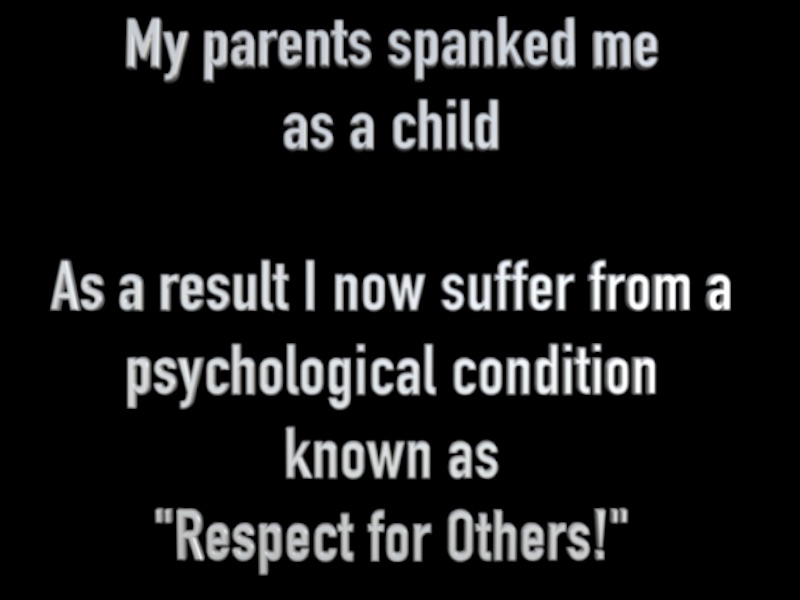home > scandal > corporal punishment
Discipline of Children - Corporal Punishment
When questioned at the Royal Commission, Governing Body member Geoffrey Jackson stated that Watchtower does not endorse corporal punishment; that is, physical punishment such as spanking a child. This exchange was surprising in light of ongoing Watchtower quotes to the contrary.
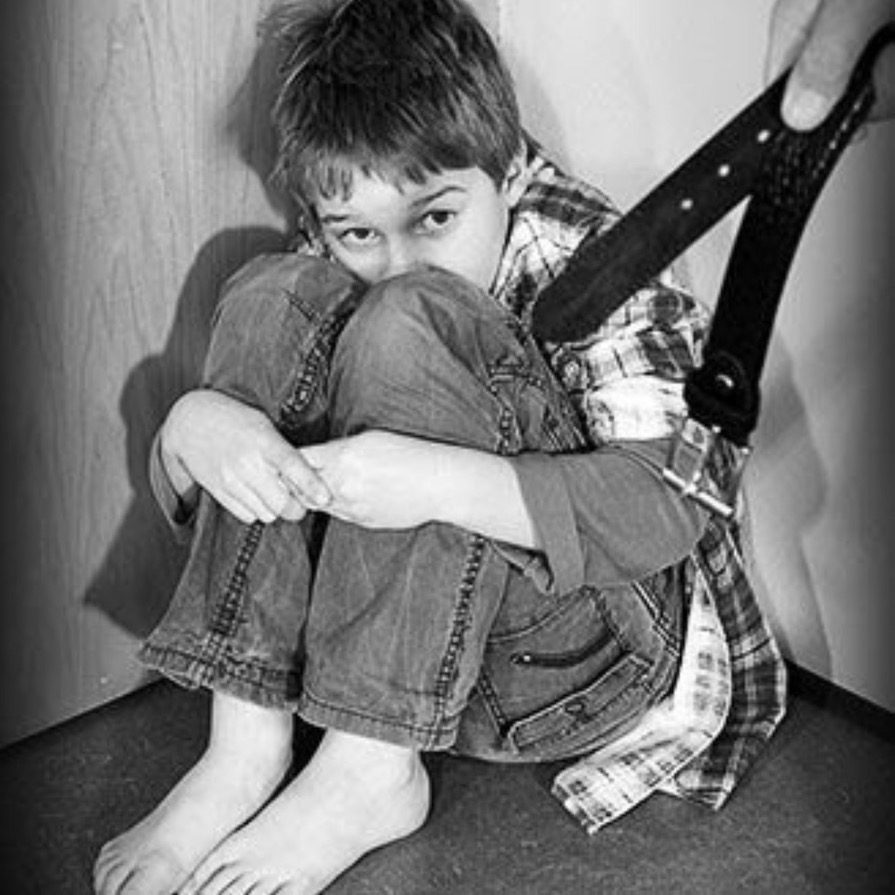
Anyone raised as a Jehovah’s Witness will have endured being hit, or have watched and heard children being taken to the back room of the Kingdom Hall for punishment. I recall the Watchtower conductor in Hobart Central congregation step off the platform and hit his daughter in front of the entire congregation. Watchtower jokes about children praying for help when being taken to the back room for punishment.
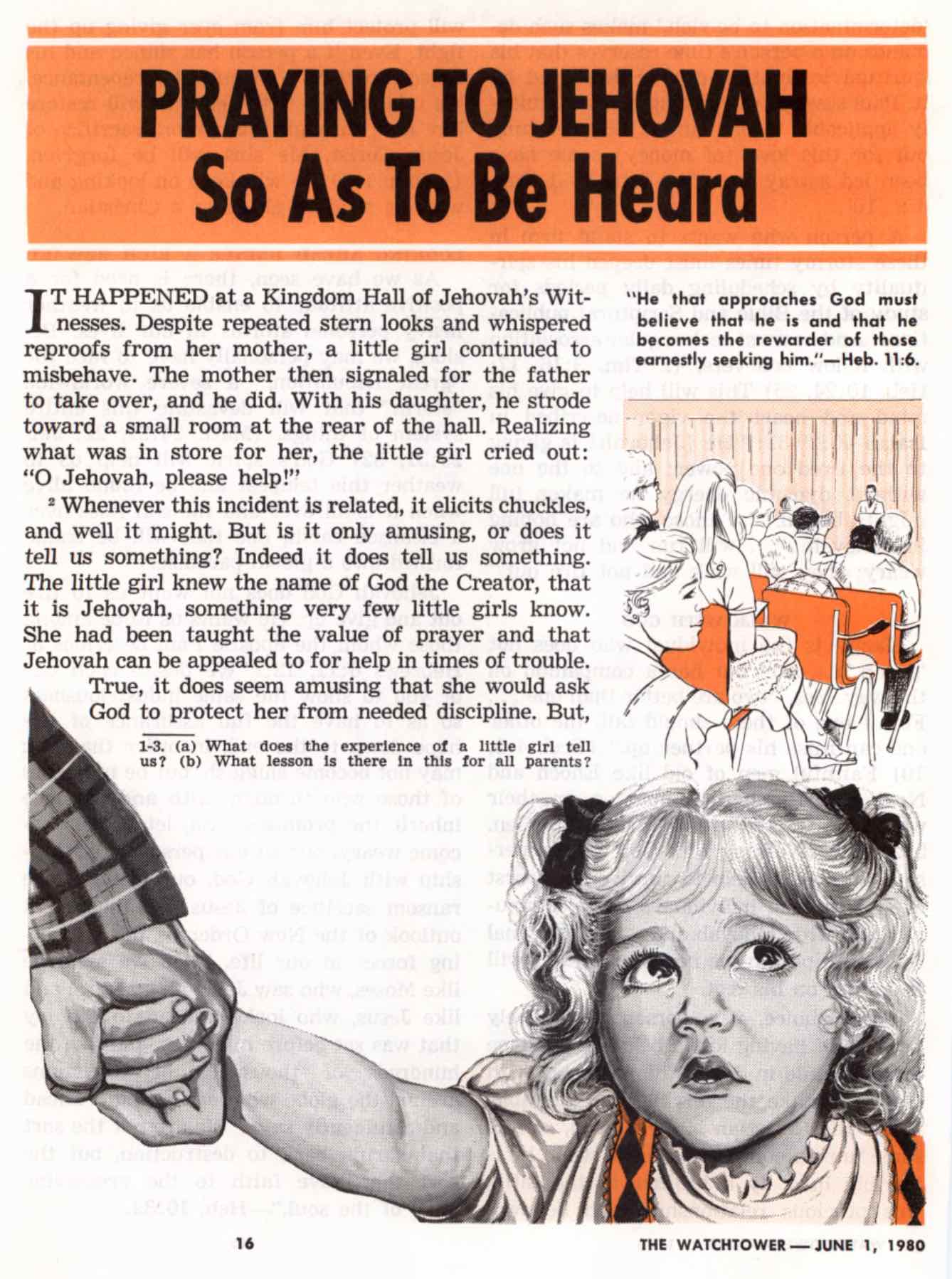
Watchtower has always advocated corporal punishment, stating that spanking is for the good of the child.
"It shows real love on the part of a parent to do whatever he can to correct his child, including spanking him." Watchtower 1973 Sep 15 pp.556-557
"A spanking may be a lifesaver to a child, for God’s Word says: “Do not hold back discipline from the mere boy. In case you beat him with the rod, he will not die. With the rod you yourself should beat him, that you may deliver his very soul from Sheol [the grave] itself.” Again, “Foolishness is tied up with the heart of a boy; the rod of discipline is what will remove it far from him.” (Proverbs 23:13, 14; 22:15) If parents hold their children’s life interests dear to them, they will not weakly or carelessly let disciplinary action slip from their hands. Love will motivate them to take action, wisely and fairly, when it is needed." Making Your Family Life Happy (1978) p.132
“The Bible is clear that discipline includes good teaching and example, but does it exclude spanking? No, for Proverbs 23:13 says: “Do not hold back discipline from the mere boy. In case you beat him with the rod [or hand], he will not die.”” Watchtower 1979 May 1 p.30
"Permissiveness breeds both juvenile insecurity and delinquency. … But both “rod and reproof” are needed." Watchtower 1986 Nov 1 pp.22-23
Whilst this is still the stand, following quotes highlight how Watchtower's wording on the topic has become increasingly cautious since the 1990's, in line with countries legally restricting physical violence against children.
Bible Advice on Corporal Punishment
The Bible encourages disciplining children physically with a rod. Proverbs 13:24 is the Scripture referred to at the Royal Commission.
Proverbs 13:24 "Whoever holds back his rod* hates his son,
But the one who loves him disciplines him diligently."
The New World Translation footnote for "rod" states;
Or “discipline; punishment.”
Proverbs adds further to the topic.
Proverbs 29:15 "The rod and reproof impart wisdom,
But a child left unrestrained brings shame on his mother."
Proverbs 22:15 "Foolishness is bound up in the heart of a boy,
But the rod of discipline will remove it far from him."
Proverbs 23:13,14 "Do not hold back discipline from a boy. If you strike him with the rod, he will not die. With the rod you should strike him, In order to save him from the Grave."
These passages specifically describe physical corporal punishment, such as the statement that if struck with the rod, “he will not die.”
Strong’s Concordance defines the word "rod" (H7626 shebet) as “rod, staff, branch, offshoot, club, sceptre, tribe.”
That this word refers to a literal rod can be seen from other passages, such as in Exodus 21:20
"And if a man smite his servant, or his maid, with a rod [H7626], and he die under his hand; he shall be surely punished."
Watchtower’s Insight on the Scriptures shows the Watchtower Writing Committee accept that the original meaning includes physical use of a rod.
"Parental authority. “Rod” is used also to symbolize the authority of parents over their children. The book of Proverbs makes many references to this authority, the term symbolizing all forms of discipline used, including the literal rod used for chastisement. The parent is actually responsible before God to exercise this rod, controlling the child. If the parent fails in this, he will bring ruination and death to his child and disgrace and God’s disapproval to himself also. (Pr 10:1; 15:20; 17:25; 19:13) “Foolishness is tied up with the heart of a boy; the rod of discipline is what will remove it far from him.” “Do not hold back discipline from the mere boy. In case you beat him with the rod, he will not die. With the rod you yourself should beat him, that you may deliver his very soul from Sheol itself.” (Pr 22:15; 23:13, 14) In fact, “the one holding back his rod is hating his son, but the one loving him is he that does look for him with discipline.”—Pr 13:24; 19:18; 29:15; 1Sa 2:27-36." Insight on the Scriptures - Volume 2 (1988) p.818
Watchtower articles encourage physical discipline of children, often with the preface that physical punishment should be accompanied by other forms of discipline.
"Different children may need to be disciplined differently. The temperament and disposition of the individual child must be considered. One child may be very sensitive, and physical punishment, such as spanking, may not always be necessary. With another, spanking may be ineffective. Or a child may be like the servant described at Proverbs 29:19, one who “will not let himself be corrected by mere words, for he understands but he is paying no heed.” In such a case the child would need corporal punishment. …
With youngsters, temporary banishment from family companionship can be more effective than spanking." Family Life (1978) pp.143,144
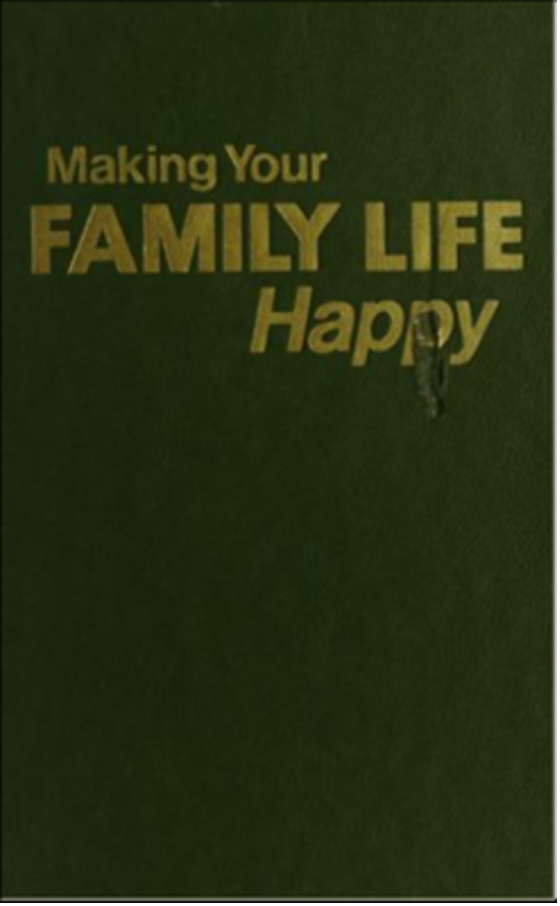
"The discipline mentioned here does not mean simply physical punishment, though that is necessary on occasion." Watchtower 1979 Apr 1 p.4
"Children can cause their parents to act against their own better judgment because of the affection their parents have for them. A child, knowing that he deserves to be spanked, may cry so pitifully that his mother just cannot bring herself to administer the deserved spanking." Watchtower 1986 Aug 15 p.17
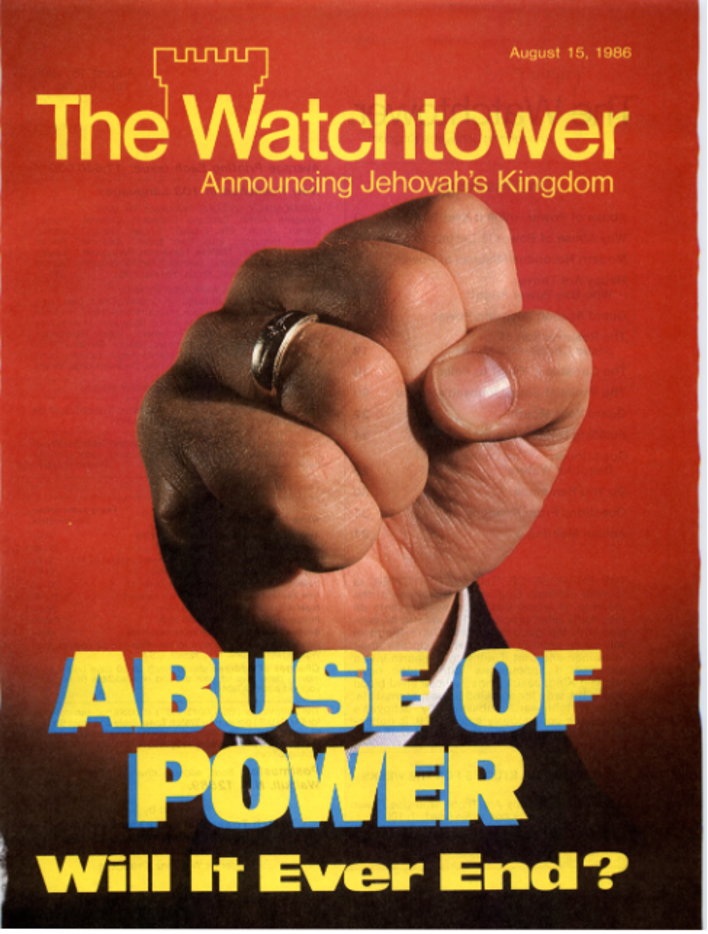
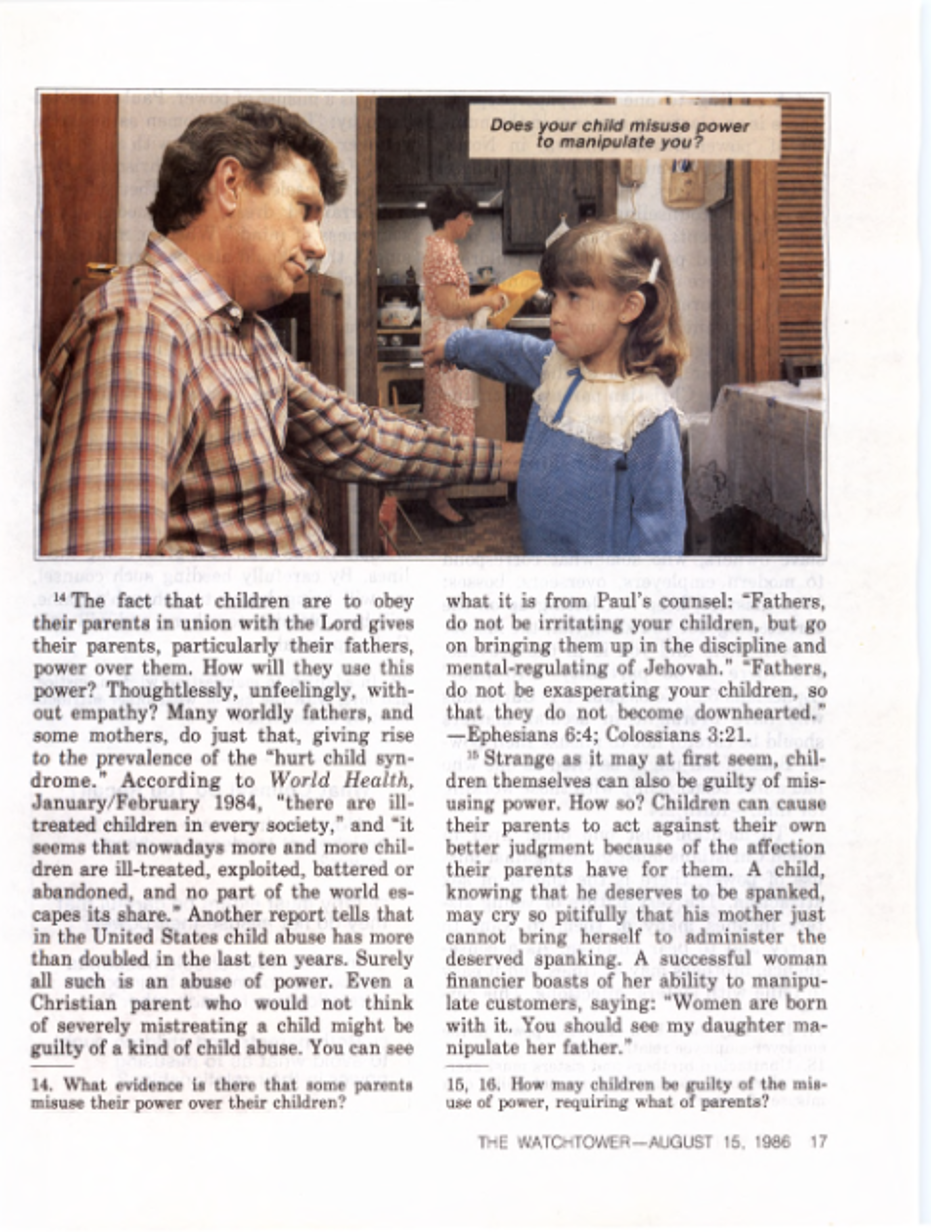
"Discipline may at times involve spanking, but often it does not." Watchtower 1987 Oct 1 p.17
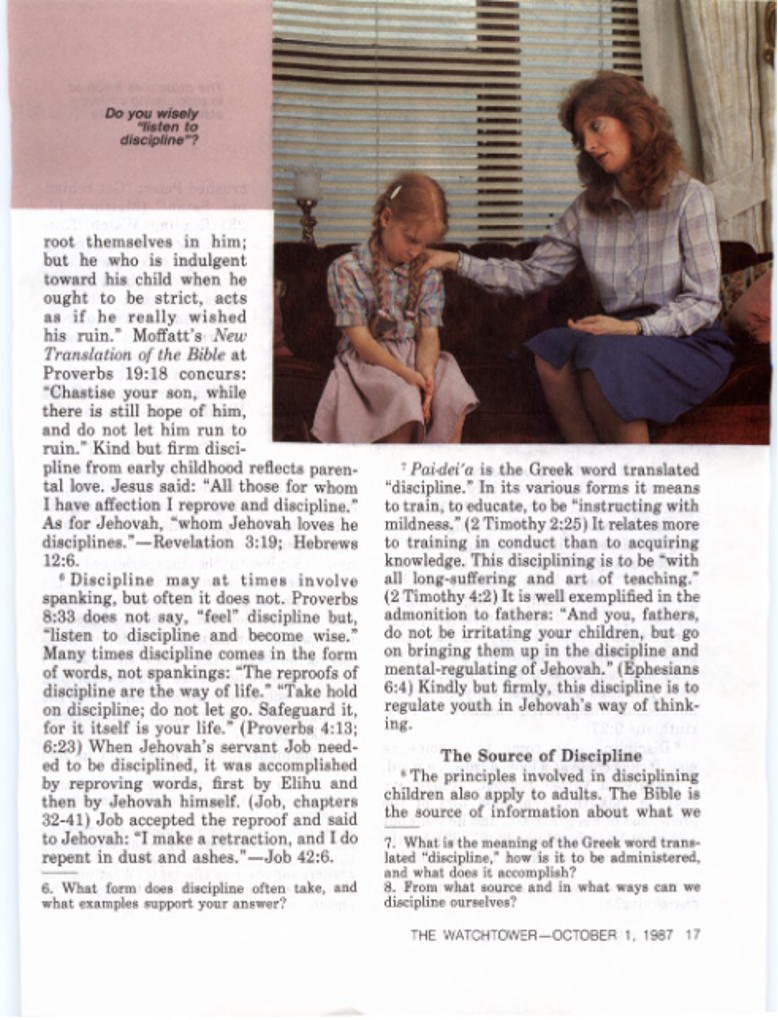
"Use of the rod, representing authority, may involve a spanking, but many times it does not. Different children, different misbehaviors, call for different disciplining." Awake! 1991 Sep 22 p.7
For the full quotes see jwfacts.com/watchtower/quotes/discipline-children.php
More Recent Quotes
A 2014 Watchtower article on discipline avoids the passages from Proverbs relating to the rod.
"Discipline primarily relates to instruction, education, and correction. It is never connected with abuse or cruelty." Watchtower 2014 Jul 1 p.10
Ironically, the article goes on to quote Malachai 3:6 on page 12, "I am Jehovah, I do not change," in a piece that avoids mentioning the Bible used to promote stoning children to death and beating them with a rod.
Whilst articles such as in the 1973 Awake! specifically direct a parent to hit their children, quotes since the 1990’s focus on the “rod of discipline” meaning authority and guidance.
“The rod and reproof are what give wisdom; but a boy let on the loose will be causing his mother shame.” (Proverbs 29:15) Some shy away from the word “rod,” thinking that it implies some kind of child abuse. But it does not. The Hebrew word for “rod” referred to a staff, such as the one a shepherd used to guide—not assault—his sheep. So the rod stands for discipline.” Awake! 1997 Aug 8 p.10
“In addition: “The rod and reproof are what give wisdom; but a boy let on the loose will be causing his mother shame.” “The rod” refers to parental authority that must be applied lovingly to prevent children from going astray. Wielding such authority does not involve abusing the child in any way. The counsel to parents is: “Do not be exasperating your children, so that they do not become downhearted.” Satisfying Life (2001) p.5
The rod is described as being like a shepherd’s staff used to guide sheep. Whilst now bestowed with a figurative application, and use of a physical rod is glossed over, spanking is still not ruled out. Passages referring to “the rod” continue to allude to the use of physical punishment.
"In this context, the rod of discipline represents a means of correction, whatever form it may take." Watchtower 2008 Apr 1 p.14
"What the EXPERTS Say . . . What the BIBLE Says
"... Dr. Benjamin Spock said: “Spanking teaches children that the larger, stronger person has the power to get his way, whether or not he is in the right.”
With regard to discipline, the Bible states: “The rod and reproof are what give wisdom.” (Proverbs 29:15) However, not all children need physical punishment." Watchtower 2006 Nov 1 p.5
"A rod is a symbol of authority. At Proverbs 13:24, it refers to parental authority. In this context, employing the rod of discipline does not necessarily mean spanking a child. Rather, it represents the means of correction, whatever form it may take. In one case, a rebuke kindly given to a child may be sufficient to correct improper behavior. Another child may require a stronger reproof." Watchtower 2004 Jul 15 p.31
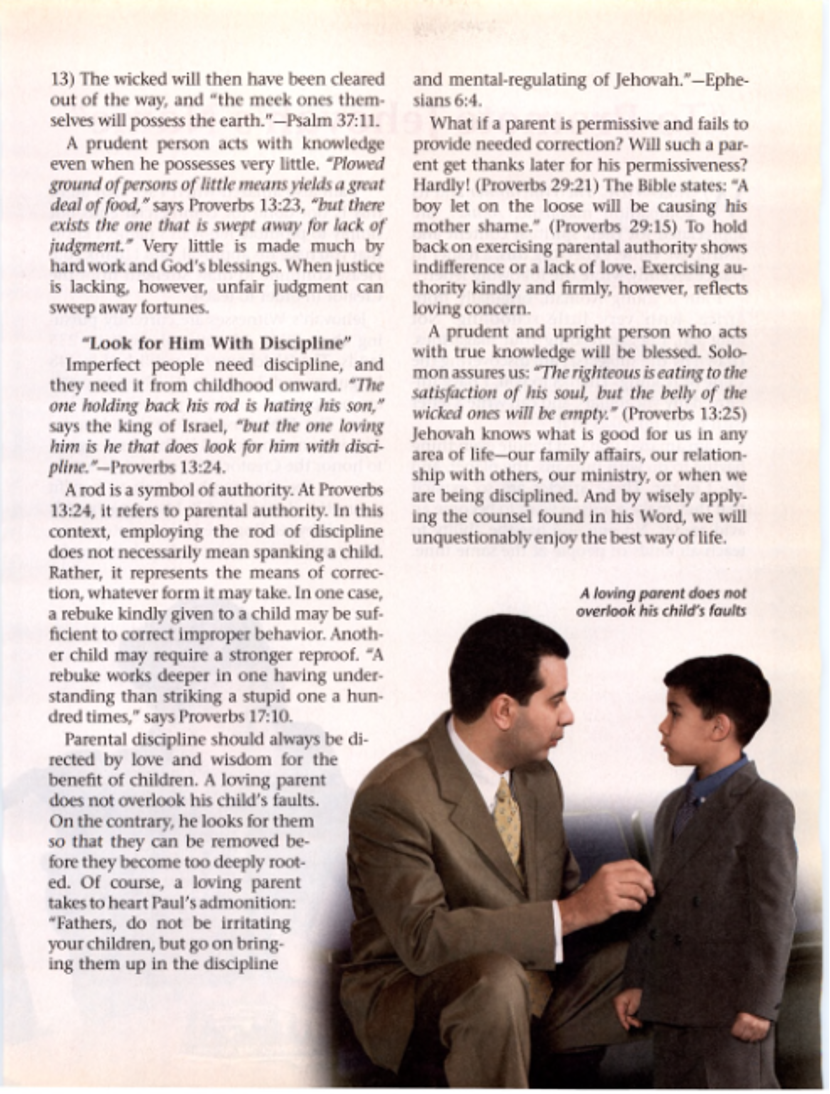
"In the Bible, the word “discipline” can mean “upbringing, training, instruction.” Children need discipline; they thrive under clear-cut guidelines, boundaries, and limits. The Bible associates such discipline, or instruction, with love. (Proverbs 13:24) Therefore, “the rod of discipline” should never be abusive—emotionally or physically. (Proverbs 22:15; 29:15) Discipline that is rigid or harsh with no sense of love is an abuse of parental authority and can crush a child’s spirit." Close to Jehovah (2002) pp.100-101
"But parental authority—“the rod of discipline”—should never be abusive. (Proverbs 22:15; 29:15) The Bible cautions parents: “Don’t over-correct your children, or you will take all the heart out of them.” (Colossians 3:21, Phillips) It also acknowledges that physical punishment is usually not the most effective teaching method." Book For All (1997) p.24
Royal Commission Transcript
Knowing that in the last decade Watchtower has continued to suggest the rod of discipline include physical punishment, the Royal Commission transcript is revealing, as Jackson lies about the Watchtower teaching on corporal punishment.
Q. What's the "discipline of Jehovah"?
A. Your Honour, the original language, discipline, indicates a process of teaching, educating, making a disciple.
Q. Well, from that reference in Ephesians, your Bible takes us back to Proverbs chapter 13, verse 24?
A. Proverbs 13:24. Yes.
Q. And the exact quote is: Whoever holds back his rod hates his son. What does that mean?
A. So, your Honour, you will notice there is an asterisk there on the term "rod", and you see the footnote.
Q. Yes.
A. "Discipline or punishment". So in the application of this, the term "rod" is used as a symbol or a metaphor to indicate the authority to give some punishment. For example, in a modern‐day setting, my father could say to me I don't go to the movies because I had broken some of the rules of the home.
Q. So it's not about inflicting corporal punishment, then?
A. It absolutely is not about inflicting corporal punishment.
Q. It would have been when first written, wouldn't it?
A. How people applied it back then, at that time, of course is open to question.
Q. Well, what you are telling me, as I understand it, is that your religion, your church, is prepared to interpret the Bible having regard to contemporary social attitudes and standards; is that right?
A. Obviously, your Honour, we need to take that into consideration, but the primary responsibility we have is to think what does Jehovah God mean by this, and we look at other scriptures. One of the problems that many folk have when they read the Bible is they take one verse and they assume it means something out of context or not in reference to other Scriptures. So for our understanding, Jehovah has said that children should be raised in a loving environment. Jesus was raised in such an environment."
The full PDF transcript can be downloaded from childabuseroyalcommission.gov.au (Viewed 27th Sep 2015)
This reply was more than evasive, it was a dishonest representation of the Watchtower stance on corporal punishment. The irony of this interchange is that Jackson had previously criticised the Royal Commission as being secular, and hence unable to correctly interpret the Bible.
"A. Well, this is one of the difficulties we have when a secular Commission is trying to analyse a religious subject."
Yet in this exchange about the original meaning of “rod”, Jackson attempted to impose a modern, secular meaning upon the passage at Proverbs 13:24. After accusing the Royal Commission for taking Scriptures out of context, that is exactly what he did in his testimony regarding the rod. The sardonicism was not lost on the Royal Commission.
Watchtower face the issue that the Bible is clearly supportive of physical punishment of children. In fact, the Old Testament went as far as to say that if a child is "stubborn and rebellious" parents should have them stoned to death, one of the most barbaric ways to die.
Deuteronomy 21:18-21 “If a man has a son who is stubborn and rebellious and he does not obey his father or his mother, and they have tried to correct him but he refuses to listen to them, his father and his mother should take hold of him and bring him out to the elders at the gate of his city and say to the elders of his city, ‘This son of ours is stubborn and rebellious, and he refuses to obey us. He is a glutton and a drunkard.’ Then all the men of his city must stone him to death."
Exodus 21:15,17 “One who strikes his father or his mother must be put to death. … Anyone who curses his father or his mother must be put to death."
"One striking his father or mother, or calling down evil upon his parents, was put to death. The reason for such strong measures was that the nation might clear away what was bad from their midst and so that “all Israel [would] hear and indeed become afraid.” Therefore, any tendency in the nation toward juvenile delinquency or disrespect of parental authority would be greatly retarded by the punishment inflicted upon such offenders." Insight on the Scriptures, Volume 1 p.435
During the Royal Commission, Justice McClellan made the excellent point that Watchtower chooses to adjust such admonition in light of modern standards, and hence asked the question as to why they so stubbornly hold to a strict interpretation of their Two Witness rule, when it has been detrimental to the safety of thousands of Jehovah’s Witness children.
In light of the quotes in this article, Jackson was not accurately representing Watchtower's position. The reason for his reply was likely to avoid legal risk. At the time of the Royal Commission, the legality of corporal punishment is under review in Australia. Whilst it is legal to spank in Australia in the home, unreasonable force may constitute assault. Whilst hitting with an open hand is still acceptable in the minds of many parents, use of an implement or “rod” is generally not. Corporal punishment is now illegal in a number of countries. Sweden became the first country to outlaw this practice in 1979, with the total number of countries growing to 4 by 1990, 11 by 2000 and 47 by 2015. (Corporal Punishment in the Home Viewed 6th Oct 2015.)
Violence Breeds Violence
Never Violence
a story told by Astrid Lindgren
In 1978, Astrid Lindgren received the German Book Trade Peace Prize for her literary contributions. In acceptance, she told the following story.
"When I was about 20 years old, I met an old pastor's wife who told me that when she was young and had her first child, she didn't believe in striking children, although spanking kids with a switch pulled from a tree was standard punishment at the time. But one day when her son was four or five, he did something that she felt warranted a spanking--the first of his life. And she told him that he would have to go outside and find a switch for her to hit him with. The boy was gone a long time. And when he came back in, he was crying. He said to her,
"Mama, I couldn't find a switch, but here's a rock that you can throw at me."
All of a sudden the mother understood how the situation felt from the child's point of view: that if my mother wants to hurt me, then it makes no difference what she does it with; she might as well do it with a stone. And the mother took the boy onto her lap and they both cried. Then she laid the rock on a shelf in the kitchen to remind herself forever: never violence. And that is something I think everyone should keep in mind. Because violence begins in the nursery--one can raise children into violence."
Watchtower blames a cited rise in child delinquency on the recommendation of authorities against physical discipline.
"Worldly authorities on rearing children frequently say: ‘No, the child should never be spanked. Avoid frustrating the child by using such strong measures to change his natural inclinations.’ A New York Times editorial, April 5, 1972, said: “‘Spare the rod and spoil the child’ is a wrong-headed adage that continues to get approving nods from self-appointed upholders of ‘the old virtues.’ It is difficult to fathom why the administration of premeditated, painful punishment by a bigger and stronger person could instill anything other than the belief that force triumphs.” But is this view correct? Is it a mistake to use physical punishment for the purpose of correcting a child’s wrong course of conduct?
God is man’s Creator. There is no higher authority. His Word is very clear on the matter. It says: “Do not hold back discipline from the mere boy. In case you beat him with the rod, he will not die. With the rod you yourself should beat him, that you may deliver his very soul from Sheol [the grave] itself.” (Prov. 23:13, 14) The life of the child is at stake. If he is allowed to pursue a wrong course, it will lead to his own unhappiness and eventual death outside God’s favor. Thus the Bible says: “The one holding back his rod is hating his son, but the one loving him is he that does look for him with discipline.” (Prov. 13:24) It shows real love on the part of a parent to do whatever he can to correct his child, including spanking him. This is God’s way. “For whom Jehovah loves,” the scripture says, “he disciplines; in fact, he scourges [whips or lashes] every one whom he receives as a son.”—Heb. 12:5, 6.
… The rejection by the world of such disciplinary training is largely responsible for the tremendous increase of juvenile delinquency and the resulting trouble and shame it has brought to parents.—Prov. 29:15." Watchtower 1973 Sep 15 pp.556-557
My mother used to discipline me with “the wooden spoon”, either on my hand or bottom, breaking a number of them in the process. I was told it was out of love, that it hurt her than it hurt me, and I was lucky that my discipline was mild, as other children were being disciplined with a belt. She would refer to Dr Benjamin Spock recanting his opinions against spanking children, and admitting blame for a generation of delinquents. I did not realise at the time that her opinions were simply parroting the Watchtower.
Watchtower has incorrectly stated numerous times that Dr Spock recanted his views against physical discipline, and that he blamed himself on a rise in delinquency.
“The Milwaukee Journal, January 22, 1974, p. 2, part 1 Spock Blames Self for Brats” Awake! 1975 Oct 8 p.6
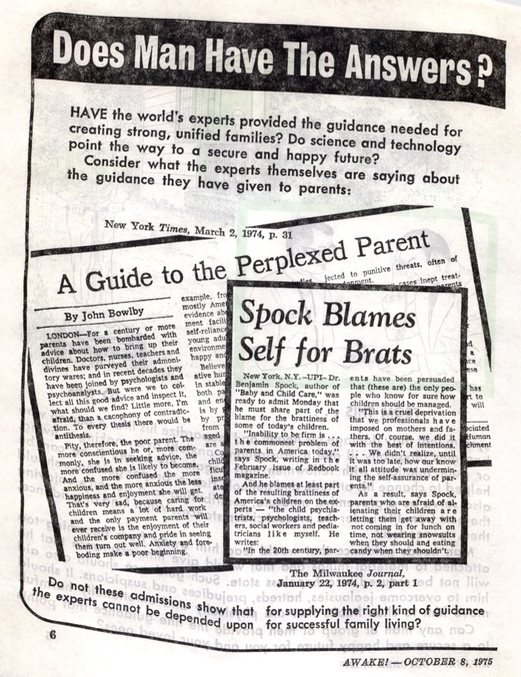
“But Dr. Benjamin Spock, himself a former proponent of permissive child training, later admitted that it was a mistake.” Awake! 1981 Dec 8 pp.14-15
“Like another preacher of unbridled self-expression, Dr. Spock, Nestius has discovered too late that he has led a generation astray.” Watchtower 1982 Feb 1 p.15
“Even Dr. Benjamin Spock, author of Baby and Child Care, took part of the blame for the lack of parental firmness and the resulting delinquency. He said blame rested on the experts, “the child psychiatrists, psychologists, teachers, social workers and pediatricians like myself.”” Watchtower 1987 Oct 1 p.16
“For a whole generation in the West, Dr. Benjamin Spock was the foremost adviser in the matter of educating children. Then he admitted that his advice had been mistaken! How much wiser to have God as our “dwelling place”!” Watchtower 1993 Mar 1 p.32
These Watchtower comments were based on a misquote and Dr Spock denies ever making such claims. Dr Spock did not recant his views on discipline. He held fast to his original work that discipline needs to be direct and consistent, but tempered with a loving environment that encourages self expression. The idea of displaying physical expressions of love was a revolutionary point of view when his book was released in 1946, and is still guidance that is of great value today.
“Dr. Spock said that Dr. Peale, Mr. Agnew and other critics had distorted what he had written. "I didn't want to encourage permissiveness, but rather to relax rigidity," he once observed. "Every once in a while, somebody would say to me, "There's a perfectly horrible child down the block whose mother tells everybody that he's being brought up entirely by your book." But my own children were raised strictly, to be polite and considerate. I guess people read into the book what they wanted to.” nytimes.com March 17, 1998
“Dr. Spock countered this with a defense of his methodology – there was, he said, no instant gratification advocated in his books. He had called for parents to express their love for their children while providing "clear, firm discipline," not instead of providing it.” legacy.com 2013

Children need loving attention from their parents or carers, which includes education and discipline. Effective discipline takes many forms, and to do so in a way that provides educated guidance takes thought and understanding of each individual child. Discipline can be broken down into five primary categories - See 5 Different Types of Child Discipline 26 Oct 2018.
- 1.) Positive Discipline - Praise and encouragement
- 2.) Gentle Discipline - Redirection
- 3.) Boundary-Based Discipline - Set clear limits and rules
- 4.) Behavior Modification - Praise and reward good behaviour, ignore or impose negative consequences for bad behaviour
- 5.) Emotion Coaching - Teach children to understand and verbalise emotions
Violence as a means of discipline is lazy and often reactionary. There is an overwhelming body of evidence to show that corporal punishment has an adverse affect on raising children. There is more agreement on this topic than most areas of social science, with one of the meta-analyses by Elizabeth Thompson Gershoff, PhD, examining 88 studies covering a period of 62 years.
“Long considered an effective, and even necessary, means of socialising children, physical punishment has been revealed to be a predictor of a wide range of negative developmental outcomes. The extent of agreement in the research literature on this issue is unusual in the social sciences. Physical punishment is associated with increased child aggression, antisocial behaviour, lower intellectual achievement, poorer quality of parent–child relationships, mental health problems (such as depression), and diminished moral internalisation. The evidence about whether physical punishment results in short-term compliance is mixed, with some studies showing effectiveness in achieving this and others not. Short-term compliance can, however, be achieved as effectively without using physical punishment.
Physical or corporal punishment is the use of force to cause pain, but not injury, for the purpose of correction or control (Straus and Stewart 1999). Although researchers attempt to distinguish between physical punishment and abuse, this is very hard to do and there is no general agreement about the dividing line between physical punishment and physical abuse." The State of Research on the Effects of Physical Punishment Anne B. Smith msd.govt.nz Viewed 6th Oct 2015.
This is supported by a study of 216,000 families, released in 2021.
"Research has continually shown that spanking leads to negative child outcomes, such as aggression and distraction, regardless of the context in which children are disciplined, including country, race and ethnicity, and neighborhood. ... In the new study, researchers at U-M's Ann Arbor and Flint campuses analyzed different forms of punishment associated with children's behaviors in a global sample of nearly 216,000 families from 62 countries. ... [spanking] led to increased aggression and distraction." Explaining to your child why behavior is wrong may not always work - 29 Jan 2021
The researchers provided the following guidance on discipline.
""It's more likely that the long-term investments that parents make in children, such as spending time with them, letting them know they are loved and listening to them, have more positive effects than nonviolent discipline. This has yet to be thoroughly researched in a global context." ... So what's the best way to discipline a child? Grogan-Kaylor suggested providing them structure, keeping the lines of communication open and providing developmentally appropriate removal of privileges." IBID
Some people hold to the fallacy that hitting a child is required to teach them respect and children that are not hit become delinquents.
This is the fallacy of confusing causation with correlation. Permissive parenting can lead to delinquency, not because of a lack of violence, but rather a general lack of loving attention and discipline in its many acceptable forms.
People believe it to be wholly unacceptable for an employer at work to hit their adult employees, either with an open hand or implement, in order to punish wrongdoing. It is incomprehensible to me that many of these same people feel it acceptable to attack a small defenceless child in that same manner, labelling it discipline. For instance, a Manager received global criticism for spanking underperforming staff with a leather strap. (Chinese bank manager in hot water for spanking underperforming employees 22 June 2016)
Some parents accept that hitting an adult is assault, yet feel strongly that hitting a child is an important part of training. At what age does violence go from being acceptable to wrong? For those that think a backhander across the face of a child is sometimes necessary, at what age do they decide to no longer dish out such "training?" Is it when a child becomes a teen, leaves school, or maybe when they are large enough to protect themselves, either physically, or legally.
Some parents I know are vocal against domestic violence towards a spouse, yet scream at and beat their children. How do they reconcile that the domestic violence they experienced was terrifying, controlling, and left permanent emotional damage, yet then perpetuate such actions upon their even more defenceless and vulnerable children.
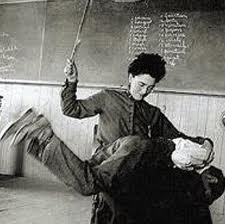
Violence breeds violence. When a parent resorts to violence to make their child obey them, they teach their children that violence is an acceptable means to get one's own way. It is no wonder that studies repeatedly show that “corporal punishment is associated with … increased child aggression, increased child delinquent and antisocial behaviour, … increased risk of being a victim of physical abuse, increased adult aggression, increased adult criminal and antisocial behaviour, decreased adult mental health, and increased risk of abusing own child or spouse.” (Gershoff 2002a:544)
Discipline Experiences Online
Researching this topic led me to a number of sad experiences of how Jehovah's Witnesses are disciplined in the name of Jehovah's loving instruction. Please be aware, some readers may find the following experiences distressing.
"I remember one time when I must have been about 6 years old, my mom took me out during the meeting and gave me SUCH a spanking...I was screaming "Help me, I'm dying!!!" Of course no one came to rescue me which I thought was just awful at the time."
"This next one happened twice in my congregation as far as i can remember (I've also heard similar stories before so it must be quite common): A little boy was being taken out the back to have the "rod of discipline" applied, and as his mother dragged him out, he screamed out, "No, nooo, help me Jehovah.""
"One of my friends' kids did that once, as she was dragging him to the bathroom he was screaming "Help Me Jehovah!!" I laugh, but it's sad."
"This one was an experience at a District Convention: A father was disciplining his child and after having firmly applied the rod, he told his child that the only reason he did that was because he loved him so much. The child responded by saying "But daddy, why do you have to love me so hard?" The experience was greeted with laughter and nods of agreement, but I thought it was despicable."
gendai.ismedia.jp (as of 10th October 2018) contains the experience of a Japanese manga artist growing up as a Jehovah's Witness. The following is just one part of her powerful art, with English translation, reading right to left.
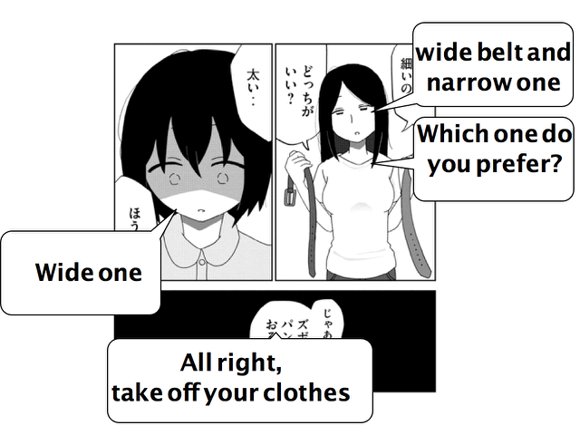
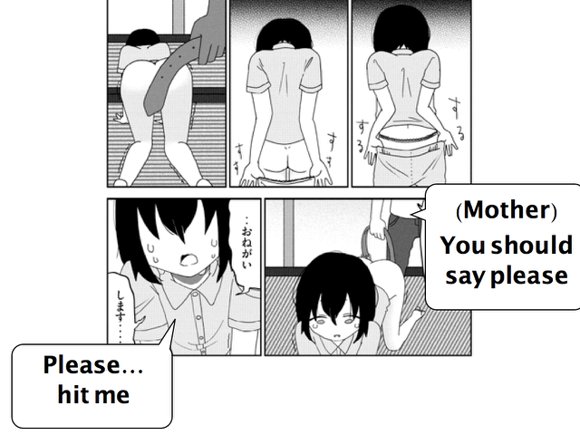

Conclusion
Jackson showed the true nature of Watchtower leadership when he falsely testified in front of the Royal Commission into Child Sexual Abuse and Jehovah's Witnesses. The Royal Commission was established to assist organizations such as Watchtower improve their practices for the sake of their members, and yet all Watchtower representatives that were questioned went out of their way to be evasive, often showing displays of contempt toward the proceedings. Jackson also highlighted the antiquated nature of Watchtower practices, and inconsistent way in which Watchtower apply Bible passages, occasionally literally and at other times figuratively, leaving the religion looking out of touch with modern society, and yet also shallow in their ability to interpret and apply Bible principles.
Video of this Article
Further Reading
For further information about corporal punishment see the article The case against spanking, Brendan L. Smith April 2012 and apa.org for several other research papers.
For the Australian legal position, and research into corporal punishment see Australian Government - Australian Institute of Family Studies March 2017
Written October 2015, latest update July 2025.
![]() Paul Grundy 2005 - 2026
Paul Grundy 2005 - 2026

